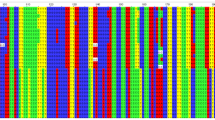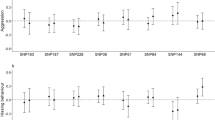Abstract
Genetic factors and environmental influences contribute to the determination of human personality traits. This study examined the influence of serotonin receptor 2A polymorphisms and parental rearing on temperament. Subjects included 1245 Japanese volunteers (592 males and 653 females). Three single-nucleotide polymorphisms (SNPs) (rs6311, rs6313 and rs643627) were selected for genotyping. All subjects completed the 125-item Japanese short version of the temperament and character inventory, and 572 completed the Japanese version of the Parental Bonding Instrument. All SNPs were in Hardy–Weinberg equilibrium. A significant association (P=0.0026) was observed between rs643627 and novelty seeking in females. On the other hand, significant effects of maternal overprotection to harm avoidance (HA) were seen for rs6311 (P=0.0005), rs6313 (P=0.0004) and rs643627 (P=0.0003) in males only. In terms of the interaction of genotype and maternal overprotection with HA, interaction was observed in rs6311 (P=0.0290) and rs6313 (P=0.0230) in females only. Our results indicate a relationship between the rs643627 polymorphism and novelty seeking in females. In terms of serotonin receptor 2A gene polymorphisms and maternal overprotection, our findings suggest the existence of a gene–environmental interaction that influences HA.
Similar content being viewed by others
Log in or create a free account to read this content
Gain free access to this article, as well as selected content from this journal and more on nature.com
or
References
Reif, A. & Lesch, K. P. Toward a molecular architecture of personality. Behav. Brain Res. 139, 1–20 (2003).
Serretti, A., Calati, R., Giegling, I., Hartmann, A. M., Moller, H. J., Colombo, C. et al. 5-HT2A SNPs and the temperament and character inventory. Progr. Neuro-Psychopharmacol. Biol. Psychiatry 31, 1275–1281 (2007).
Serretti, A., Drago, A. & De Ronchi, D. HTR2A gene variants and psychiatric disorders: a review of current literature and selection of SNPs for future studies. Curr. Med. Chem. 14, 2053–2069 (2007).
Harvey, J. A. Role of the serotonin 5-HT(2A) receptor in learning. Learning Memory (Cold Spring Harbor, NY) 10, 355–362 (2003).
Rybakowski, F., Slopien, A., Dmitrzak-Weglarz, M., Czerski, P., Rajewski, A. & Hauser, J. The 5-HT2A -1438 A/G and 5-HTTLPR polymorphisms and personality dimensions in adolescent anorexia nervosa: association study. Neuropsychobiology 53, 33–39 (2006).
Ham, B. J., Kim, Y. H., Choi, M. J., Cha, J. H., Choi, Y. K. & Lee, M. S. Serotonergic genes and personality traits in the Korean population. Neurosci. Lett. 354, 2–5 (2004).
Cloninger, C. R., Svrakic, D. M. & Przybeck, T. R. A psychobiological model of temperament and character. Arch. Gen. Psychiatry 50, 975–990 (1993).
Cloninger, C. R. A systematic method for clinical description and classification of personality variants. A proposal. Arch. Gen. Psychiatry 44, 573–588 (1987).
Parker, G. Parental characteristics in relation to depressive disorders. Br. J. Psychiatry 134, 138–147 (1979).
Reti, I. M., Samuels, J. F., Eaton, W. W., Bienvenu, O. J. III, Costa, P. T. Jr. & Nestadt, G. Influences of parenting on normal personality traits. Psychiatry Res. 111, 55–64 (2002).
Oshino, S., Suzuki, A., Ishii, G. & Otani, K. Influences of parental rearing on the personality traits of healthy Japanese. Comprehens. Psychiatry 48, 465–469 (2007).
Kijima, N., Saito, R., Takeuchi, M., Yoshino, A., Ono, Y., Kato, M. et al. Cloninger’s seven-factor model of temperament and character and Japanese version of Temperament and Character Inventory (TCI). Seishinkashindangaku 7, 379–399 (1996).
Ogawa, M. A study on the reliability and validity of the Japanese version of the PBI (Parental Bonding Instrument). Seishinkachiryogaku 6, 1193–1201 (1991).
Ishii, G., Suzuki, A., Oshino, S., Shiraishi, H. & Otani, K. CYP2C19 polymorphism affects personality traits of Japanese females. Neurosci. Lett. 411, 77–80 (2007).
Shimizu, E., Hashimoto, K., Ohgake, S., Koizumi, H., Okamura, N., Koike, K. et al. Association between angiotensin I-converting enzyme insertion/deletion gene functional polymorphism and novelty seeking personality in healthy females. Progr. Neuro-Psychopharmacol. Biol. Psychiatry 30, 99–103 (2006).
Comings, D. E., Gade-Andavolu, R., Gonzalez, N., Wu, S., Muhleman, D., Blake, H. et al. A multivariate analysis of 59 candidate genes in personality traits: the temperament and character inventory. Clin. Genet. 58, 375–385 (2000).
Fink, G., Sumner, B., Rosie, R., Wilson, H. & McQueen, J. Androgen actions on central serotonin neurotransmission: relevance for mood, mental state and memory. Behav. Brain Res. 105, 53–68 (1999).
Eriksson, E., Alling, C., Andersch, B., Andersson, K. & Berggren, U. Cerebrospinal fluid levels of monoamine metabolites. A preliminary study of their relation to menstrual cycle phase, sex steroids, and pituitary hormones in healthy women and in women with premenstrual syndrome. Neuropsychopharmacology 11, 201–213 (1994).
Jokela, M., Lehtimaki, T. & Keltikangas-Jarvinen, L. The serotonin receptor 2A gene moderates the influence of parental socioeconomic status on adulthood harm avoidance. Behav. Genet. 37, 567–574 (2007).
Parker, G. Parental reports of depressives. An investigation of several explanations. J. Affect. Disorders 3, 131–140 (1981).
Acknowledgements
We sincerely thank the volunteers for their participation in this study. We also thank Dr R Ishihara and Ms J Tsuda for their technical assistance. Funding for this study was provided by research grants from the Ministry of Education, Culture, Sports, Science and Technology of Japan; the Ministry of Health, Labor and Welfare of Japan; Grant-in-Aid for Scientific Research on Pathomechanisms of Brain Disorders from the Ministry of Education, Culture, Sports, Science and Technology of Japan; The Academic Frontier Project for Private Universities, Comparative Cognitive Science Institutes; and the Core Research for Evolutional Science and Technology. These institutions had no further role in the study design; the collection, analysis and interpretation of the data; the writing of this report; or in the decision to submit the paper for publication.
Author information
Authors and Affiliations
Corresponding author
Ethics declarations
Competing interests
The authors declare no conflict of interest.
Rights and permissions
About this article
Cite this article
Nakamura, Y., Ito, Y., Aleksic, B. et al. Influence of HTR2A polymorphisms and parental rearing on personality traits in healthy Japanese subjects. J Hum Genet 55, 838–841 (2010). https://doi.org/10.1038/jhg.2010.110
Received:
Revised:
Accepted:
Published:
Issue date:
DOI: https://doi.org/10.1038/jhg.2010.110
Keywords
This article is cited by
-
Novelty Seeking and Drug Addiction in Humans and Animals: From Behavior to Molecules
Journal of Neuroimmune Pharmacology (2016)
-
Temperament, Character, and Personality Disorders in Chronic Pain
Current Pain and Headache Reports (2013)
-
Association Between DARPP-32 Gene Polymorphism and Personality Traits in Healthy Chinese-Han Subjects
Journal of Molecular Neuroscience (2011)



